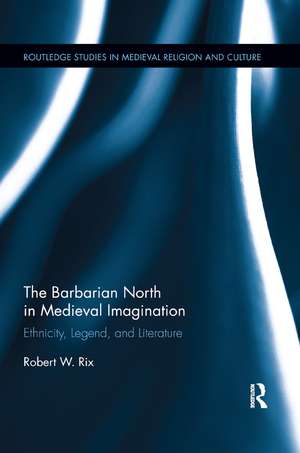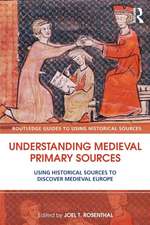The Barbarian North in Medieval Imagination: Ethnicity, Legend, and Literature: Routledge Studies in Medieval Religion and Culture
Autor Robert Rixen Limba Engleză Paperback – 10 dec 2019
| Toate formatele și edițiile | Preț | Express |
|---|---|---|
| Paperback (1) | 389.66 lei 43-57 zile | |
| Taylor & Francis – 10 dec 2019 | 389.66 lei 43-57 zile | |
| Hardback (1) | 1109.18 lei 43-57 zile | |
| Taylor & Francis – 19 noi 2014 | 1109.18 lei 43-57 zile |
Preț: 389.66 lei
Nou
Puncte Express: 584
Preț estimativ în valută:
74.56€ • 78.06$ • 61.69£
74.56€ • 78.06$ • 61.69£
Carte tipărită la comandă
Livrare economică 07-21 aprilie
Preluare comenzi: 021 569.72.76
Specificații
ISBN-13: 9780367871130
ISBN-10: 0367871130
Pagini: 224
Dimensiuni: 152 x 229 x 23 mm
Greutate: 0.45 kg
Ediția:1
Editura: Taylor & Francis
Colecția Routledge
Seria Routledge Studies in Medieval Religion and Culture
Locul publicării:Oxford, United Kingdom
ISBN-10: 0367871130
Pagini: 224
Dimensiuni: 152 x 229 x 23 mm
Greutate: 0.45 kg
Ediția:1
Editura: Taylor & Francis
Colecția Routledge
Seria Routledge Studies in Medieval Religion and Culture
Locul publicării:Oxford, United Kingdom
Public țintă
Postgraduate and UndergraduateCuprins
Introduction 1. Ethnogenesis and the ‘Out-of-Scandinavia’ Legend 2. The Goths and the Legend of Scandza 3. Ethnic History and the Origin of Nations 4. Ancestral Rhetoric in Bede’s Ecclesiastical History of the English People 5. Northumbrian Angels in Rome: Religion, Race and Politics in the Anecdote of St Gregory 6. Scandinavian Ancestors in Anglo-Saxon Texts 7. Danes and Geatas: Heroes of the Legendary North
Notă biografică
Robert W. Rix is Associate Professor in the Department of English, Germanic, and Romance Studies at the University of Copenhagen, Denmark. He is the author of the book William Blake and the Cultures of Radical Christianity (2007) and is chief editor of Romantik – Journal for the Study of Romanticisms. In recent years, Rix has written a number of articles on the use of Norse mythology in British fiction, and he has published an anthology on Norse tradition in English poetry.
Recenzii
"Through sound, comprehensive research and analysis, Rix successfully unfolds plausible geographical, cultural, and political aspects of a topos that originates as an expression of alterity as much as a historical reality. Summing Up: Recommended." - A. P. Church, CHOICE
Descriere
This book examines the ‘out-of-Scandinavia’ legend (Scandinavia as an ancestral homeland) in a wide range of medieval texts, focusing on the Anglo-Saxon tradition. Rix maps how these discourses informed ‘national’ legends of ancestral origins, showing how an ‘out-of-Scandinavia’ legend can be found in works by writers like Jordanes, Bede,


























